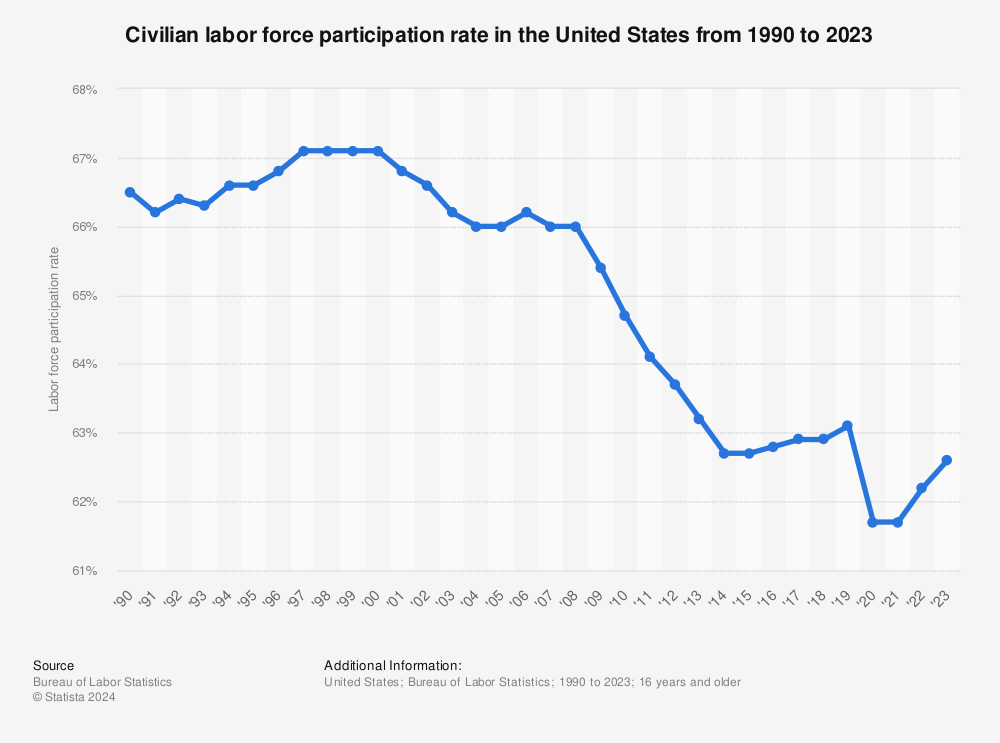Although the US economy, stock market, and corporate profits have boomed, many middle-class jobs and sectors have been permanently gutted, and the low unemployment rate masks the fact that record number of men, in particular, have dropped-out, going on disability. Furthermore the labor market is increasingly bifurcated. The greatest relative job growth in the post-2008 economy has been in the low-paying service sector, followed by high-paying jobs:

This is illustrated by the fact the labor force participation rate plunged during the Great Recession, but never recovered in spite of an otherwise strong economy:

Culturally, in the ’90s, extroverts ruled, but now we seem to be living in the era of the introvert, and the tables have turned from introverts being low-status to now high-status, and ‘nerds’ are not only having leading roles in pop culture and entertainment, but also in the overall US economy. From Wealth, Intellectualism, and Individualism:
Back in 1994, a less intelligent era dominated by shows like Friends, Baywatch, and 90210, social conventions were more important than they are now, making Gates’ behavior truly anomalous, but now it’s commonplace, almost expected, and (as mentioned earlier) conveys authenticity and honesty. In the ’90s, the clubs were busting, but now everyone wants to stay at home, quiet, watching Netflix, being introspective, or posting pictures on Instagram. Nightclub attendance has plunged.
Compare that to today and how of the the most popular TV shows such as The Big Bang Theory and Silicon Valley feature socially-awkward geniuses as the main characters. From Era of the Introvert, and the demise of ‘Careerism’:
It seems like we’re definitely in the ‘era of the introvert’…more and more people are writing about being introverted, describing their experiences, to much approval. Decades ago, it seemed like extroverts were in control, but now that has flipped, and factors such the information/knowledge-based economy and ‘intellectualism culture’ may be to blame, as I explain in Introverts Rule the World.
To get an idea of how much things have changed and how the scales have tipped in favor of nerds and other groups that in the ’90s were social misfits relegated to
the bottom rungs in terms of social status, we live in a online culture where to call someone a ‘normie’, as in to be normal, is an insult. Angela Nagel’s 2018 book Kill all Normies shows how the biggest culture wars have changed, from in the ’90s being waged by TV, radio, and newspaper pundits, to now online between various fringe group factions that are now wielding as much influence, if not more so, as the mainstream media.
Recent years have seen a revival of the heated culture wars of the 1990s, but this time its battle ground is the internet. On one side the alt right ranges from the once obscure neo-reactionary and white separatist movements, to geeky subcultures like 4chan, to more mainstream manifestations such as the Trump-supporting gay libertarian Milo Yiannopolous. On the other side, a culture of struggle sessions and virtue signalling lurks behind a therapeutic language of trigger warnings and safe spaces. The feminist side of the online culture wars has its equally geeky subcultures right through to its mainstream expression. Kill All Normies explores some of the cultural genealogies and past parallels of these styles and subcultures, drawing from transgressive styles of 60s libertinism and conservative movements, to make the case for a rejection of the perpetual cultural turn.
Additionally, the rise of so-called ‘intellectualism culture’ has imbued any topic, no matter how small or obscure, with a devout online following and renewed interest, whether it’s philosophy, bodybuilding and weightlifting, quantum physics, or even modern monetary theory. In the ’90s, interest in such subjects was mostly relegated to domain-specific experts and research universities, but now the internet has opened these topics to a much wider audience, and there’s tons of interest and status bestowed upon experts of even the most esoteric and difficult of fields, such as category theory [Reddit AMAs by scientists often get as many up-votes and approving comments as AMAs by celebrities, and high-IQ subs such as /r/economics and /r/philosophy are very popular, with submissions that not uncommonly gets thousands of votes and engendering impassioned debate about complicated matters].
A recent Hacker News submission about “Applied Category Theory” got over four-hundred of up-votes…obviously there is considerable interest in these complicated niche subjects, that 20-25 years ago either didn’t exist or was ignored. I call this the so-called “Cambrian Explosion” of intellectualism. And as the massive viralness of Olver Lee Batemen’s recent article The Unheard History of Bodybuilding Forums, as Told by the Trolls, which went viral on Hacker News and Reddit alongside articles about Feynman and black holes, shows that no topic–no matter how small or inconsequential–is immune from examination. People of average IQs tend to be practical, whereas smarter people seek novelty, which could explain why, online, there’s so much renewed attention to these niche, esoteric topics.
Regarding that bodybuilding article, it’s true that although in the ’90s there was less misinformation, there was much less information overall. As Oliver correctly notes, Instagram has created an industry of fake fitness experts, but at the same time, the rise of Reddit and other ‘smart’ forums offers a counterbalance. But also, people in the comments sections of Instagram and Twitter are astute at sniffing out BS and don’t hesitate to call it out, whether it’s people who claim to be ‘natural’ using steroids or the use of ‘fake weights’.